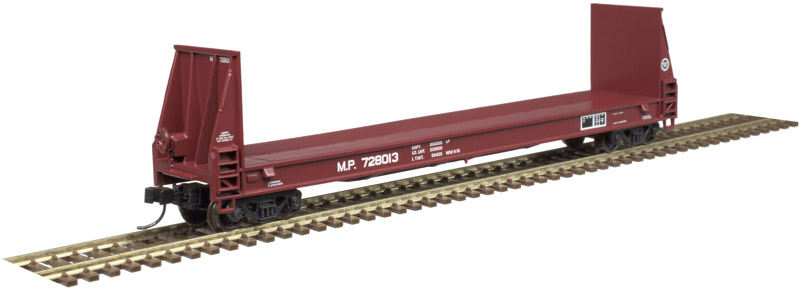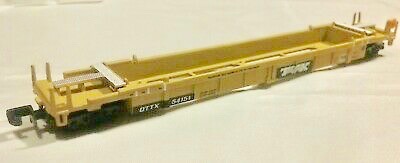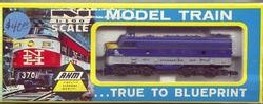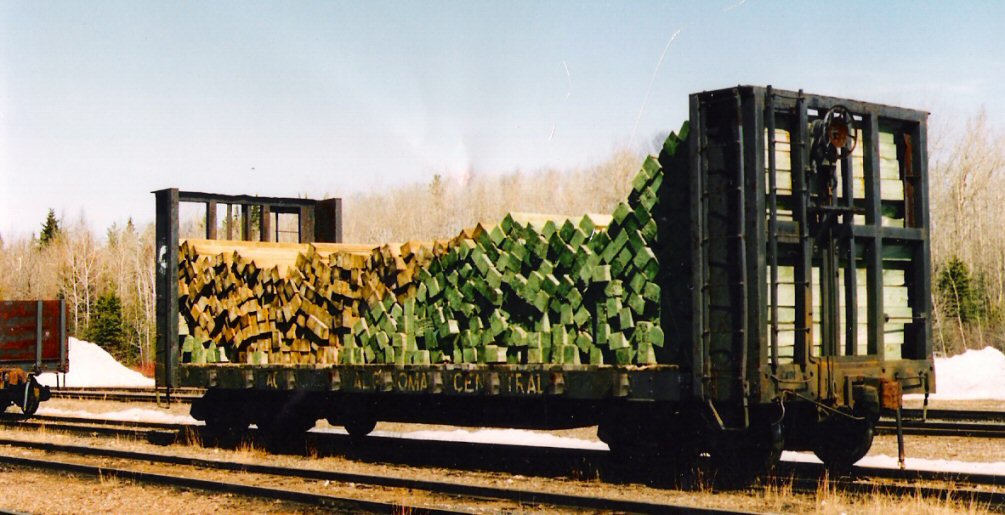Model Information: Introduced in December 1998, with a second limited run in 2010.
Originally referred to by Walthers as 60' Pulpwood cars (60'=total length), they were later called 50' Pulpwood cars (50'=interior length).
Ready-to-run, the model features a heavy die-cast body, styrene details, free-rolling trucks and standard (Rapido) couplers - Accumate couplers for the second run.
Available in singles for $8.98 or in 3-packs for $26.98.
Re-run under Atlas brand in 2019 after Atlas purchased the tooling from Walthers.
Matching pulpwood load: Walthers 933-800
Here is how Walthers described them:
Pulpwood is an important source of fiber for making paper. Walthers ready-to-run Pulpwood Car is a southern style car constructed by SIECO (Southern Iron & Equipment Co.) beginning in the 1960s.
It carries loads of wood cut about four feet long, and stacked into the "V" sloped floors of the car, where each side holds the other in place.
Walthers advertised concurrently its Superior Paper Company (933-3237), with these words "Seen wherever pulpwood moves to paper mills, these cars are just the ticket for moving raw materials to the Superior Paper Co".
Originally referred to by Walthers as 60' Pulpwood cars (60'=total length), they were later called 50' Pulpwood cars (50'=interior length).
Ready-to-run, the model features a heavy die-cast body, styrene details, free-rolling trucks and standard (Rapido) couplers - Accumate couplers for the second run.
Available in singles for $8.98 or in 3-packs for $26.98.
Re-run under Atlas brand in 2019 after Atlas purchased the tooling from Walthers.
Matching pulpwood load: Walthers 933-800
Here is how Walthers described them:
Pulpwood is an important source of fiber for making paper. Walthers ready-to-run Pulpwood Car is a southern style car constructed by SIECO (Southern Iron & Equipment Co.) beginning in the 1960s.
It carries loads of wood cut about four feet long, and stacked into the "V" sloped floors of the car, where each side holds the other in place.
Walthers advertised concurrently its Superior Paper Company (933-3237), with these words "Seen wherever pulpwood moves to paper mills, these cars are just the ticket for moving raw materials to the Superior Paper Co".
Prototype History: Pulpwood is not a specific type of wood, but actually tree limbs that are cut to a specified length, then turned into wood pulp and used in the paper industry. Early paper making had the trees near the paper plant. As timber resources were diminished, the need for transporting pulpwood began to rise. Railroads were seen as an efficient method of transporting pulpwood. Pulpwood in the Southeast and Northeast is generally cut into four-foot or less lengths and loaded onto "V-deck" bulkhead flat cars.
In the early 1950s General Steel Castings, produced a "V-deck" design.
Another notable manufacturer of pulpwood flat cars was the Southern Iron & Equipment Company (SIECO) that manufactured this type of car in the 1960s and 1970s, with over 800 delivered in the early 1979’s to the Southern Railway, alone.
In the early 1950s General Steel Castings, produced a "V-deck" design.
Another notable manufacturer of pulpwood flat cars was the Southern Iron & Equipment Company (SIECO) that manufactured this type of car in the 1960s and 1970s, with over 800 delivered in the early 1979’s to the Southern Railway, alone.
Road Name History: 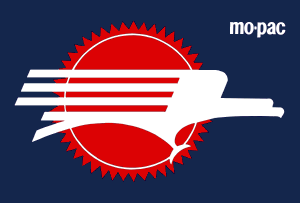 The Missouri Pacific Railroad (reporting mark MP), commonly abbreviated MoPac, with nickname of The Mop, was one of the first railroads in the United States west of the Mississippi River. MoPac was a Class I railroad growing from dozens of predecessors and mergers, including the St. Louis, Iron Mountain and Southern Railway (SLIMS), Texas and Pacific Railway (TP), Chicago and Eastern Illinois Railroad (C&EI), St. Louis, Brownsville and Mexico Railway (SLBM), Kansas, Oklahoma and Gulf Railway (KO&G), Midland Valley Railroad (MV), San Antonio, Uvalde and Gulf Railroad (SAU&G), Gulf Coast Lines (GC), International-Great Northern Railroad (IGN), New Orleans, Texas and Mexico Railway (NOTM), Missouri-Illinois Railroad (MI), as well as the small Central Branch Railway (an early predecessor of MP in Kansas and south central Nebraska), and joint ventures such as the Alton and Southern Railroad (AS).
The Missouri Pacific Railroad (reporting mark MP), commonly abbreviated MoPac, with nickname of The Mop, was one of the first railroads in the United States west of the Mississippi River. MoPac was a Class I railroad growing from dozens of predecessors and mergers, including the St. Louis, Iron Mountain and Southern Railway (SLIMS), Texas and Pacific Railway (TP), Chicago and Eastern Illinois Railroad (C&EI), St. Louis, Brownsville and Mexico Railway (SLBM), Kansas, Oklahoma and Gulf Railway (KO&G), Midland Valley Railroad (MV), San Antonio, Uvalde and Gulf Railroad (SAU&G), Gulf Coast Lines (GC), International-Great Northern Railroad (IGN), New Orleans, Texas and Mexico Railway (NOTM), Missouri-Illinois Railroad (MI), as well as the small Central Branch Railway (an early predecessor of MP in Kansas and south central Nebraska), and joint ventures such as the Alton and Southern Railroad (AS).
In 1967, the railroad operated 9,041 miles of road and 13,318 miles of track, not including DK&S, NO&LC, T&P and its subsidiaries, C&EI and Missouri-Illinois.
On January 8, 1980, the Union Pacific Railroad agreed to buy the Missouri Pacific Railroad. Lawsuits filed by competing railroads delayed approval of the merger until September 13, 1982. After the Supreme Court denied a trial to the Southern Pacific, the merger took effect on December 22, 1982. However, due to outstanding bonds of the Missouri Pacific, the merger with Union Pacific become official only on January 1, 1997.
Read more on Wikipedia.

In 1967, the railroad operated 9,041 miles of road and 13,318 miles of track, not including DK&S, NO&LC, T&P and its subsidiaries, C&EI and Missouri-Illinois.
On January 8, 1980, the Union Pacific Railroad agreed to buy the Missouri Pacific Railroad. Lawsuits filed by competing railroads delayed approval of the merger until September 13, 1982. After the Supreme Court denied a trial to the Southern Pacific, the merger took effect on December 22, 1982. However, due to outstanding bonds of the Missouri Pacific, the merger with Union Pacific become official only on January 1, 1997.
Read more on Wikipedia.
Brand/Importer Information: In 1924 Stephan Schaffan, Sr. founded the Atlas Tool Company in Newark, New Jersey. In 1933 his son, Stephan Schaffan, Jr., came to work for his father at the age of sixteen. Steve Jr. built model airplanes as a hobby and frequented a local hobby shop. Being an enterprising young man, he would often ask the owner if there was anything he could do to earn some extra spending money. Tired of listening to his requests, the hobby-store owner threw some model railroad track parts his way and said, "Here, see if you can improve on this".
In those days, railroad modelers had to assemble and build everything from scratch. Steve Jr. created a "switch kit" which sold so well, that the entire family worked on them in the basement at night, while doing business as usual in the machine shop during the day.
Subsequently, Steve Jr. engineered the stapling of rail to fiber track, along with inventing the first practical rail joiner and pre-assembled turnouts and flexible track. All of these products, and more, helped to popularize model railroading and assisted in the creation of a mass-market hobby. The budding entrepreneur quickly outgrew the limitations of a basement and small garage operation. Realizing they could actually make a living selling track and related products, Steve and his father had the first factory built in Hillside, New Jersey at 413 Florence Avenue in 1947. On September 30, 1949, the Atlas Tool Company was officially incorporated as a New Jersey company.
In 1985, Steve was honored posthumously for his inventions by the Model Railroad Industry Association and was inducted into the Model Railroad Industry Hall of Fame in Baltimore, Maryland. In addition, Steve was nominated and entered into the National Model Railroad Association Pioneers of Model Railroading in 1995.
In the early 1990s, the Atlas Tool Company changed its name to Atlas Model Railroad Company, Inc.
In those days, railroad modelers had to assemble and build everything from scratch. Steve Jr. created a "switch kit" which sold so well, that the entire family worked on them in the basement at night, while doing business as usual in the machine shop during the day.
Subsequently, Steve Jr. engineered the stapling of rail to fiber track, along with inventing the first practical rail joiner and pre-assembled turnouts and flexible track. All of these products, and more, helped to popularize model railroading and assisted in the creation of a mass-market hobby. The budding entrepreneur quickly outgrew the limitations of a basement and small garage operation. Realizing they could actually make a living selling track and related products, Steve and his father had the first factory built in Hillside, New Jersey at 413 Florence Avenue in 1947. On September 30, 1949, the Atlas Tool Company was officially incorporated as a New Jersey company.
In 1985, Steve was honored posthumously for his inventions by the Model Railroad Industry Association and was inducted into the Model Railroad Industry Hall of Fame in Baltimore, Maryland. In addition, Steve was nominated and entered into the National Model Railroad Association Pioneers of Model Railroading in 1995.
In the early 1990s, the Atlas Tool Company changed its name to Atlas Model Railroad Company, Inc.
Item created by: CNW400 on 2019-03-21 13:31:52. Last edited by CNW400 on 2020-06-04 13:43:34
If you see errors or missing data in this entry, please feel free to log in and edit it. Anyone with a Gmail account can log in instantly.
If you see errors or missing data in this entry, please feel free to log in and edit it. Anyone with a Gmail account can log in instantly.


